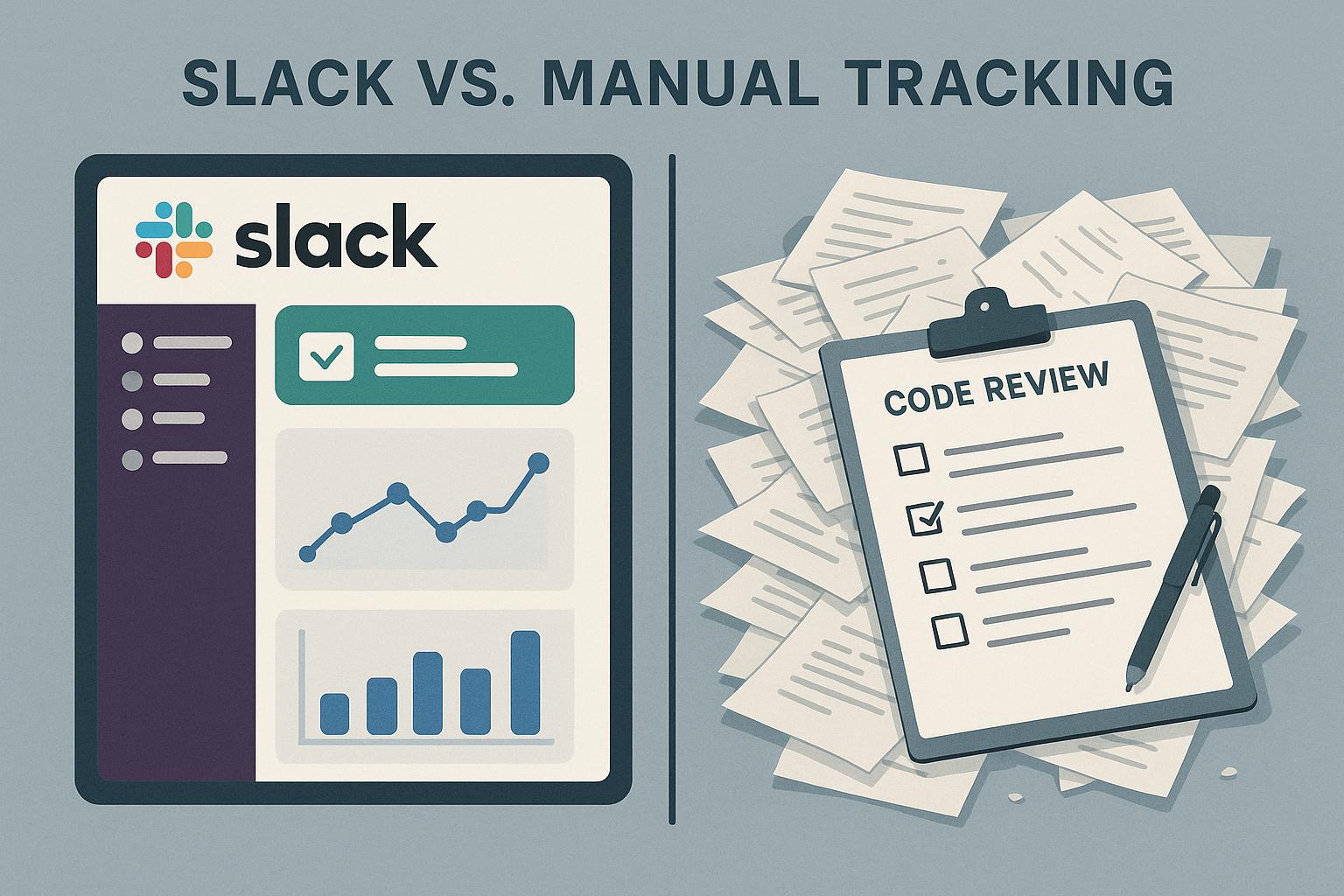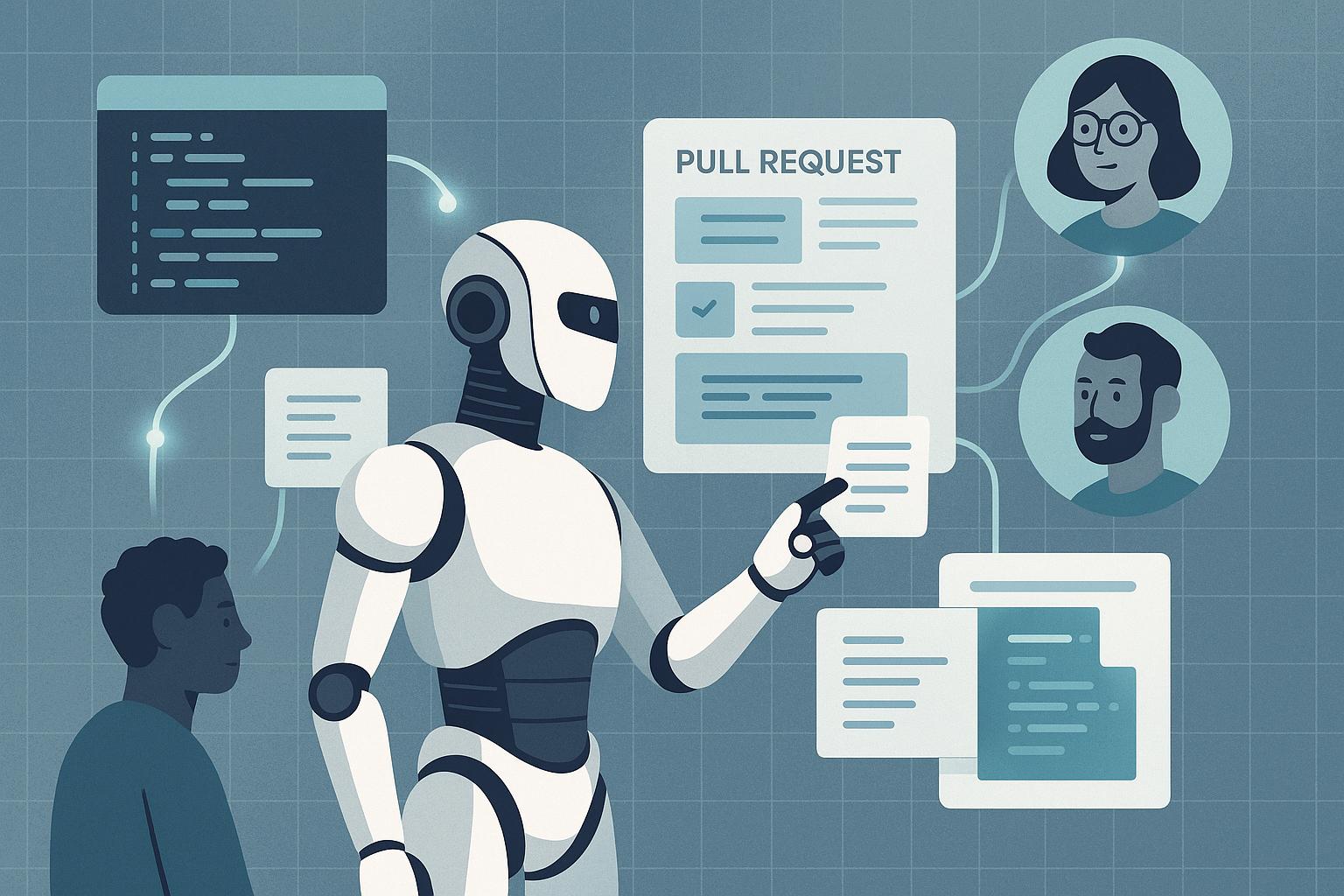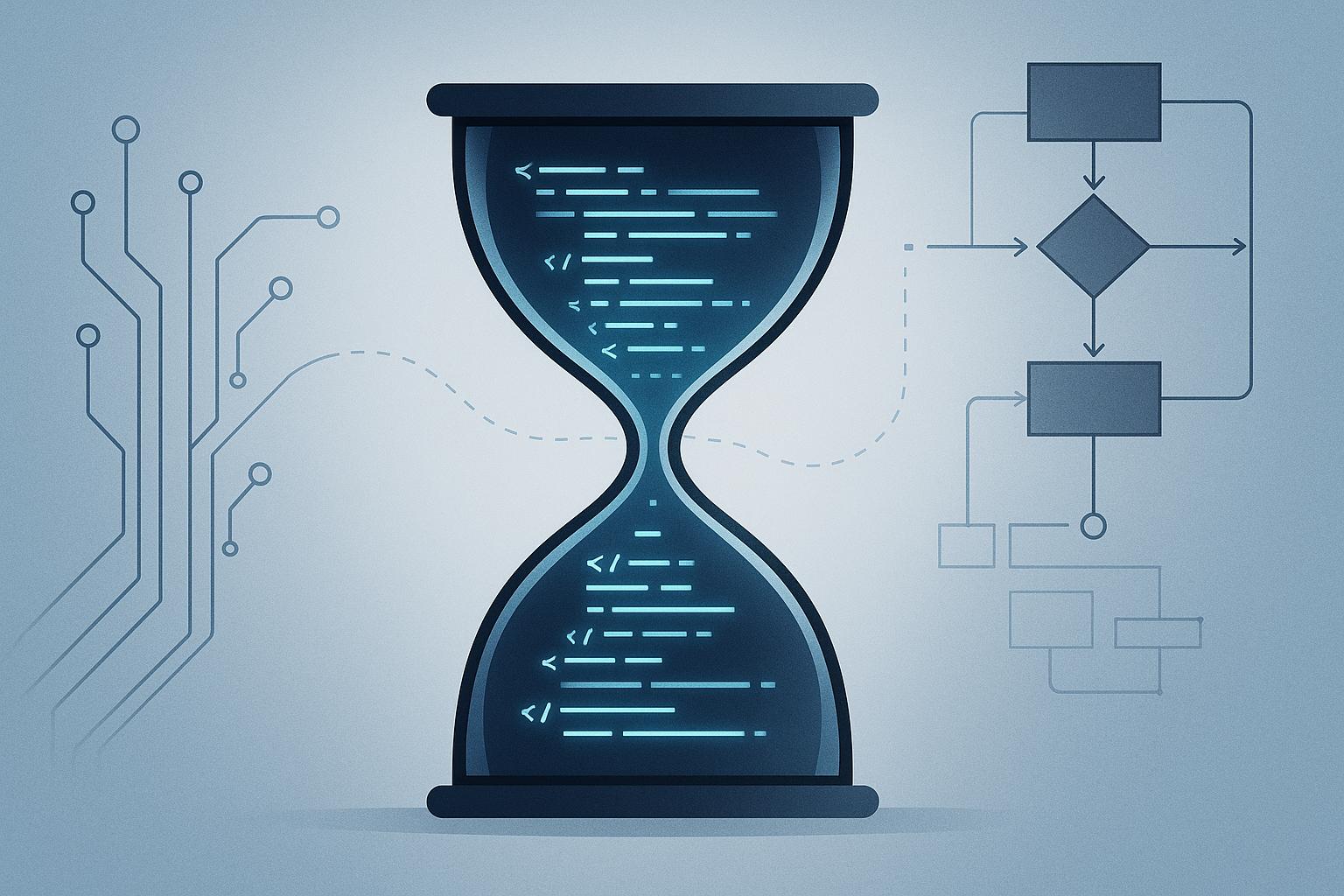Delays in code reviews slow down development by 20-40%. Teams lose 5.8 hours per developer weekly, with pull requests sitting for an average of 4.4 days before review. The result? Missed deadlines, increased bugs, and mounting technical debt.
Automated PR comment alerts can cut review delays by up to 60%. Here's how:
- Real-time notifications: Keep developers updated instantly via Slack, reducing response times.
- Automatic reminders: Ensure no comments are left unresolved, speeding up reviews.
- Centralized tracking: Organize comment threads for better collaboration and fewer context switches.
Tools like ReviewNudgeBot integrate with GitHub and Bitbucket to streamline the process, helping distributed teams stay efficient and productive. Want faster, smoother reviews? Start with automated alerts.
Business Impact of Delayed Code Reviews
When code reviews are delayed, the effects ripple far beyond the development team. In fact, research highlights that 44% of development teams cite slow code reviews as the main bottleneck in their delivery pipelines.
Slower Development Speed
Delays in code reviews directly impact development timelines, leading to measurable setbacks:
| Impact Area | Effect |
|---|---|
| Feature Delivery | 2–5 day delay per review cycle |
| Sprint Velocity | 20–40% reduction |
| Team Capacity | 5.8 hours lost per developer weekly |
Take the example of a fintech startup in Missouri: their recurring 3-day code review delays caused them to miss a critical quarter-end release. The result? Lost contracts and revenue. Moreover, delays force developers to constantly shift tasks, further chipping away at productivity.
"It's even more important for individual responses to come quickly than for the process to happen rapidly." – Google's code review policy
Context Switching Costs
One of the hidden consequences of delayed reviews is the toll of frequent context switching. Every time developers switch between tasks - like checking for updates on review comments - it disrupts their focus. Research shows it can take up to 23 minutes to regain full concentration after switching tasks. These interruptions lead to several challenges:
- Increased cognitive load by 30% due to prolonged review cycles
- Drop in engagement: Developer engagement decreases by 32% after waiting 48 hours for a review
- Feeling blocked: 52% of developers report being unable to proceed due to delays
This cycle becomes self-perpetuating: as reviews take longer, developers pick up new tasks while waiting, leading to more context switching. The result? Higher error rates, reduced code quality, and a less reliable final product.
Worse still, prolonged delays contribute to the buildup of technical debt. Developers, under pressure to meet deadlines, may cut corners, creating long-term maintenance headaches and inflating future development costs.
PR Comment Alerts Make Reviews Faster
PR comment alerts offer a practical way to tackle review delays. By integrating Slack notifications, teams can significantly speed up the code review process. In fact, data shows that implementing automated alerts can reduce the average time-to-merge for pull requests from 2.40 days to just 1.51 days within two weeks.
Instant Slack Updates
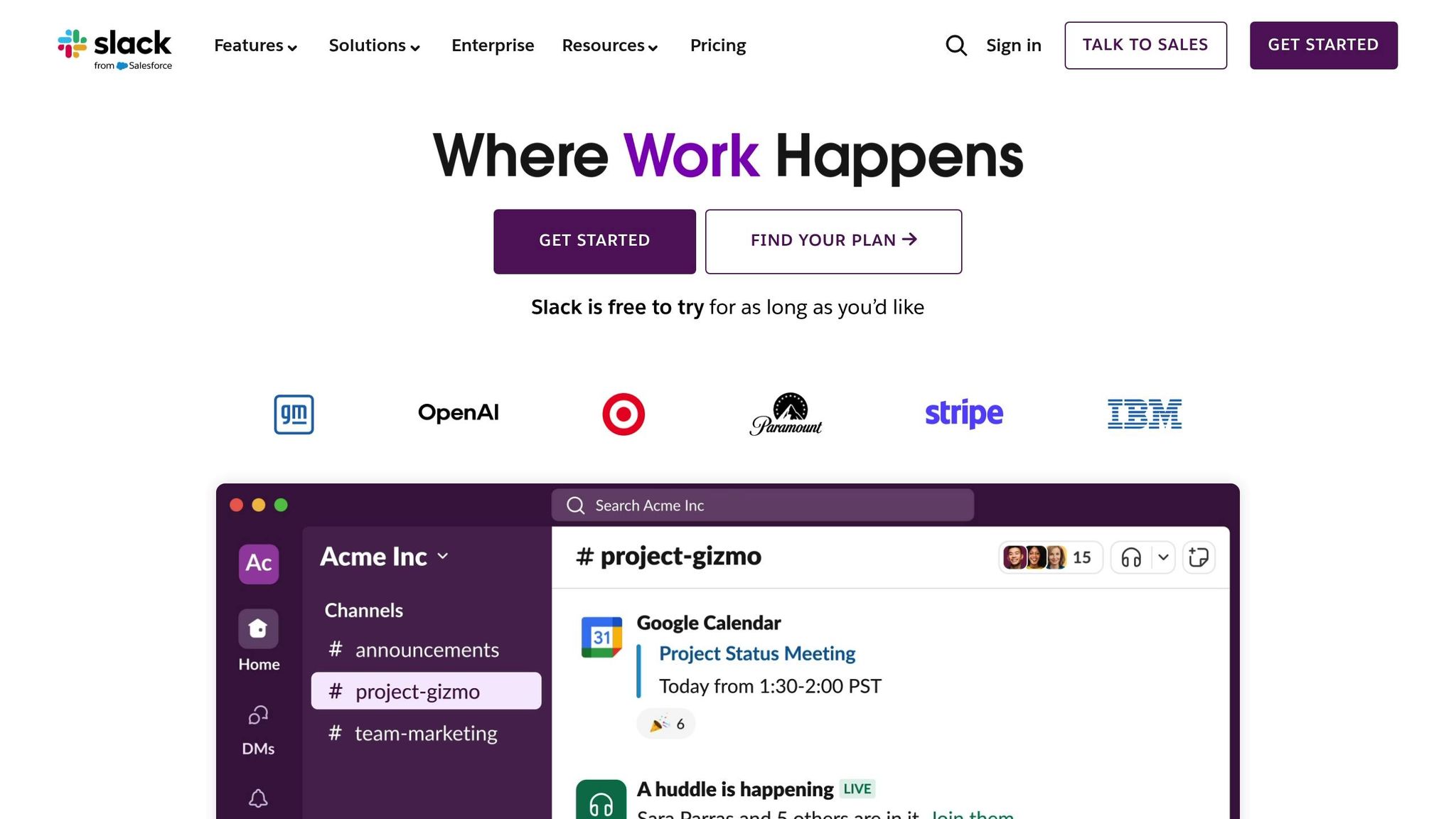
Real-time Slack notifications eliminate the need to constantly check GitHub or email for updates. This approach is particularly useful for distributed teams working across different time zones, enabling quicker responses while the details are still fresh. A great example is Runn.io, which centralized its review discussions in Slack and adopted automated notifications. This change cut their average review times from 14 hours to just 4 hours.
Better Comment Thread Tracking
Centralized tracking of comment threads ensures reviews stay on track. Research shows developers are 12 times more effective at spotting issues by reading code rather than discussing it in meetings. Yet, teams typically spend 75% of their time in meetings and only 25% reading code. Real-time comment tracking delivers several advantages:
| Benefit | Outcome |
|---|---|
| Response Time | Instant updates for new comments |
| Issue Resolution | Faster fixes through organized discussions |
| Team Involvement | Better collaboration across time zones |
| Context Retention | Less context switching between tools |
These features help reviews progress smoothly, keeping everyone aligned.
Automatic Follow-ups for Old Comments
Automated reminders ensure no comment is left unresolved, cutting review times by as much as 50%. Delayed reviews can cost developers up to 5 hours per week, or 12.5% of their working time. Teams that schedule reminders every 6 hours, set a 24-hour response standard, and use dedicated Slack channels for notifications report significant improvements.
For example, one SaaS company reduced its pull request turnaround time by 50% after implementing automated reminders to address a 48-hour delay in reviews.
Tools like ReviewNudgeBot make these processes seamless by integrating with platforms like GitHub and Bitbucket. Teams can customize notifications to strike the right balance between staying informed and avoiding notification overload.
sbb-itb-7c4ce77
ReviewNudgeBot Features for Code Reviews
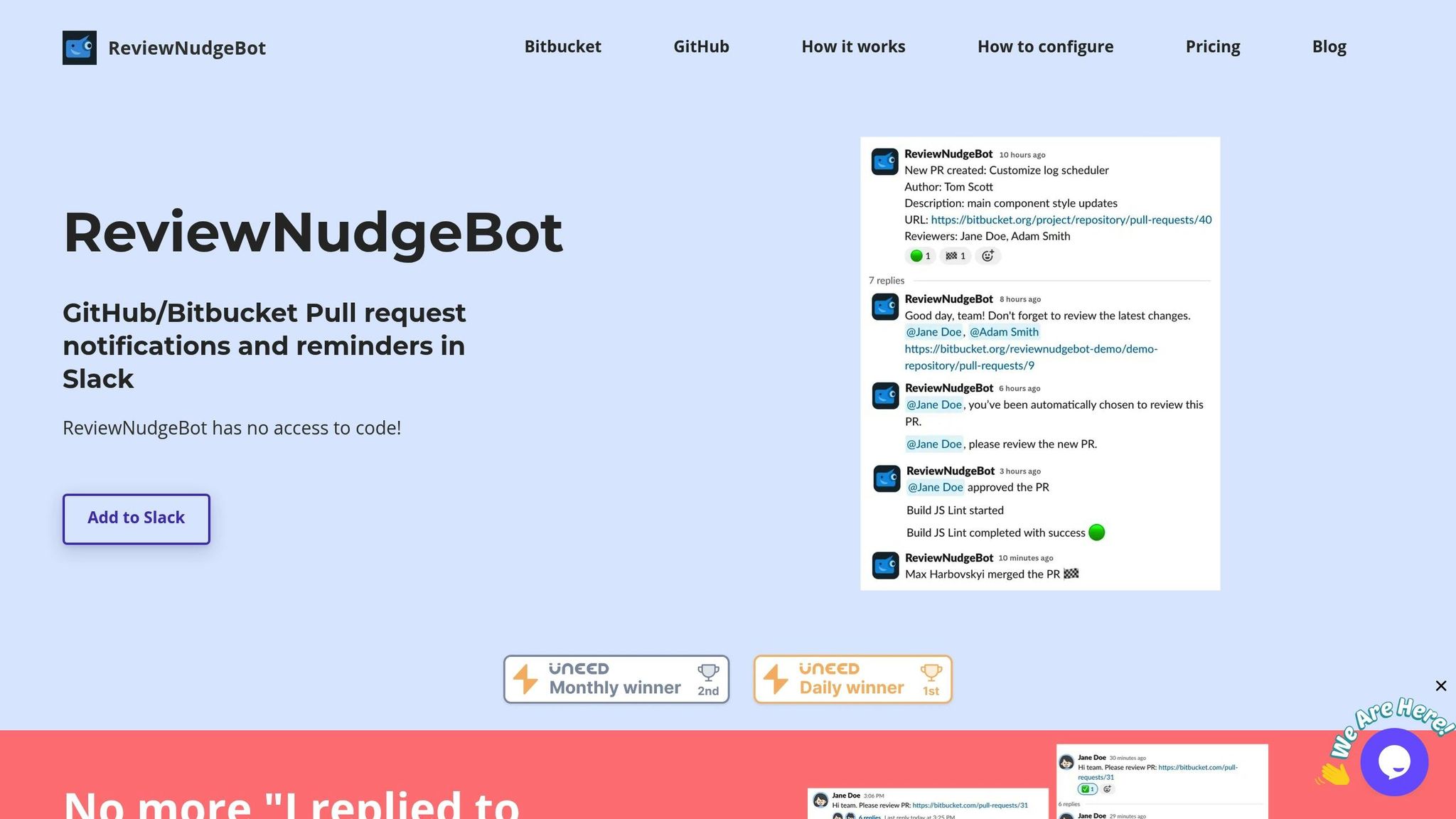
ReviewNudgeBot takes the idea of automated alerts to the next level, helping teams cut review delays by as much as 60% through automated pull request (PR) comment notifications.
Main ReviewNudgeBot Functions
The bot is designed to eliminate review bottlenecks with a set of smart, automated features. It organizes all PR notifications into Slack threads, ensuring discussions stay clear and on-topic. Whenever new comments are added to PRs or files, relevant team members are notified instantly.
| Feature | How It Speeds Up Reviews |
|---|---|
| Comment Threading | Keeps conversations organized for clarity |
| Smart Notifications | Alerts only the right team members |
| Build Status Alerts | Shares real-time updates on PR build results |
| Automatic Reminders | Nudges team members to address pending tasks |
Automated reminders have proven their worth, with 73% of over 210,000 reminders rated as helpful in moving reviews forward. These features integrate seamlessly with repository platforms, making the entire process smoother and faster.
GitHub and Bitbucket Integration
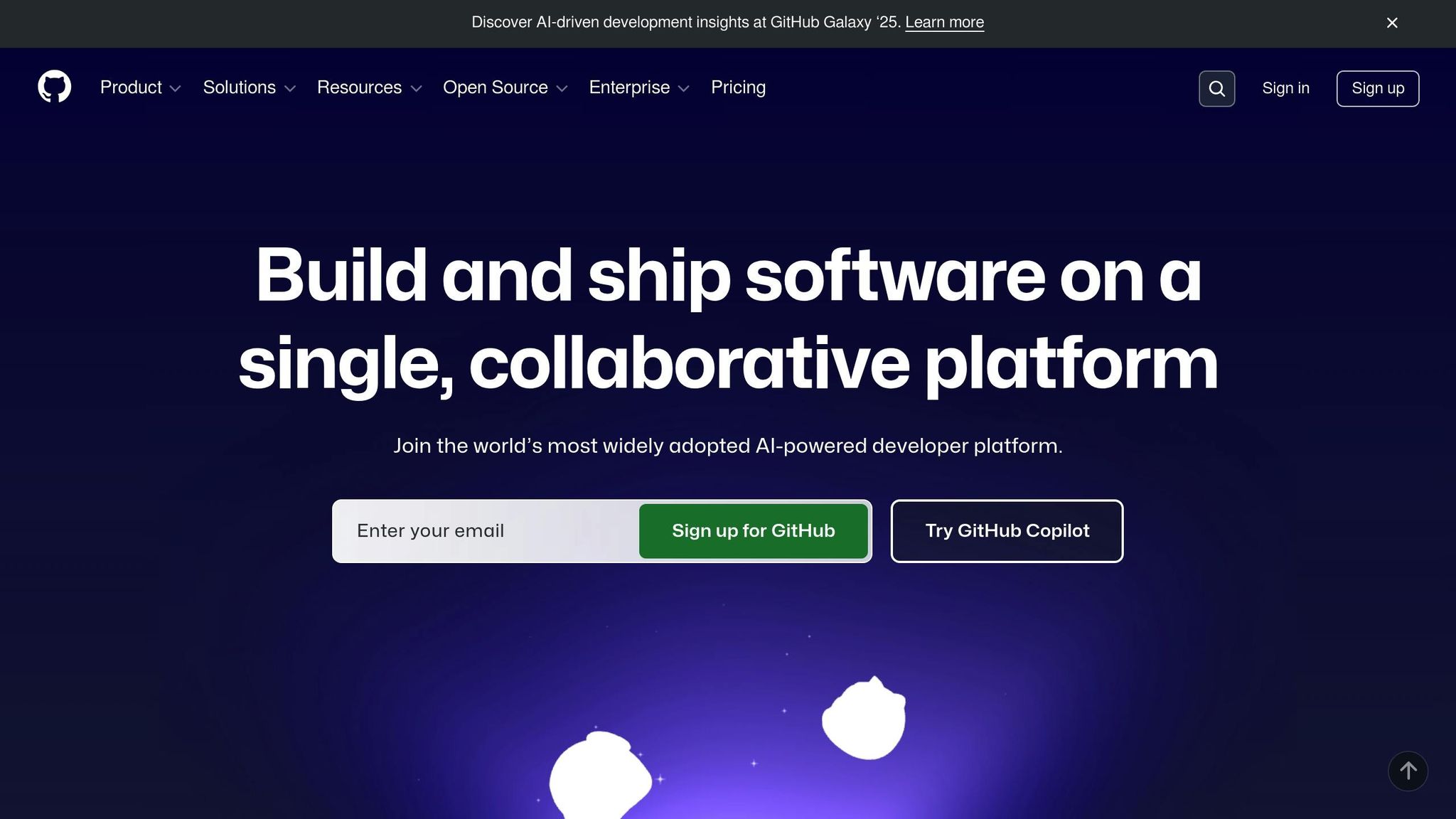
ReviewNudgeBot works effortlessly with GitHub and Bitbucket, ensuring that teams can stay on top of their reviews. The Pro Plan includes webhook integration for both platforms, enabling the bot to track pull requests and send updates directly to Slack channels.
This integration simplifies setup and ensures PRs get timely attention. The bot’s targeted notifications ensure efficiency - authors are informed about pending comments or failed builds, while reviewers are updated on new commits or resolved discussions.
Data Access and Settings
Security is a top priority for ReviewNudgeBot. It uses a read-only approach to repository data, accessing only webhook events and never the actual code. This ensures sensitive information remains protected while still delivering the updates teams need.
Notification settings can also be tailored to fit specific team workflows:
- Set working hours to avoid alerts outside of business hours
- Adjust reminder frequencies based on PR status
- Fine-tune notifications for specific team members
- Use emoji reactions to manage reminders easily
This combination of security, flexibility, and customization helps teams speed up their code review processes, with many reporting up to 60% faster completion times.
Conclusion: Speed Up Reviews with Comment Alerts
Delays in code reviews can seriously disrupt productivity. Studies indicate that inefficient review processes cost development teams an average of 5.8 hours per developer each week, leading to a 20-40% drop in overall development speed.
PR comment alerts are a game-changer. These real-time notifications help developers stay on task and can enhance time-to-market by as much as 40%. Tools like ReviewNudgeBot take this a step further, cutting review delays by up to 60% through automated reminders and smart notifications. These features ensure critical pull requests get the attention they need without unnecessary lag.
The data makes a strong case for adopting a structured approach. By using automated alerts, setting clear response time expectations, and establishing escalation paths, teams can maintain their momentum and sidestep costly delays. Integrating ReviewNudgeBot with platforms like Slack ensures pull requests stay on track, fosters fair workload distribution, and keeps code changes flowing smoothly.
Don’t let reviews slow you down. Start today by setting up PR comment alerts and defining response time goals. With the right tools, you can turn your review process into a well-oiled machine that drives collaboration and accelerates development.
FAQs
How do pull request comment alerts help speed up the code review process?
Pull request (PR) comment alerts help streamline the code review process by delivering real-time notifications to developers about comments, reviews, and status updates. This ensures feedback gets addressed quickly, minimizing delays and keeping projects on track.
Automating these alerts can shorten review cycles, making collaboration smoother and more efficient - especially for distributed teams. When paired with tools like Slack, these alerts improve visibility and keep everyone in sync, allowing pull requests to progress through the pipeline more efficiently.
How does ReviewNudgeBot help speed up code reviews?
ReviewNudgeBot streamlines the code review process by automating several critical tasks. It sends out prompt pull request reminders, ensuring reviewers stay focused and deadlines aren't missed. Plus, it assigns reviewers automatically using customizable rules, helping teams avoid unnecessary delays.
The tool also offers build status updates and comment notifications, keeping everyone in the loop throughout the review process. These features enhance communication and accountability, making it especially useful for distributed teams. The result? Faster, more efficient code reviews that keep projects moving forward.
How does context switching affect developers during code reviews, and how can automated alerts help reduce these challenges?
Context switching can seriously derail a developer's focus and productivity during code reviews. Research shows that every time someone shifts their attention between tasks, it can take up to 23 minutes to fully regain concentration. This repeated shifting not only drains mental energy but also makes it harder to dive deeply into the code. The result? Slower reviews and a higher chance of mistakes slipping through.
One way to tackle this issue is with automated alerts. These notifications keep developers updated on pull requests and changes in real time, all within a central hub like Slack. By cutting down on the need to check multiple tools or deal with unnecessary distractions, developers can stay immersed in their current work and handle code reviews more effectively.
